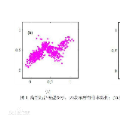The Gromov-Wasserstein (GW) distance is frequently used in machine learning to compare distributions across distinct metric spaces. Despite its utility, it remains computationally intensive, especially for large-scale problems. Recently, a novel Wasserstein distance specifically tailored for Gaussian mixture models and known as MW (mixture Wasserstein) has been introduced by several authors. In scenarios where data exhibit clustering, this approach simplifies to a small-scale discrete optimal transport problem, which complexity depends solely on the number of Gaussian components in the GMMs. This paper aims to extend MW by introducing new Gromov-type distances. These distances are designed to be isometry-invariant in Euclidean spaces and are applicable for comparing GMMs across different dimensional spaces. Our first contribution is the Mixture Gromov Wasserstein distance (MGW), which can be viewed as a Gromovized version of MW. This new distance has a straightforward discrete formulation, making it highly efficient for estimating distances between GMMs in practical applications. To facilitate the derivation of a transport plan between GMMs, we present a second distance, the Embedded Wasserstein distance (EW). This distance turns out to be closely related to several recent alternatives to Gromov-Wasserstein. We show that EW can be adapted to derive a distance as well as optimal transportation plans between GMMs. We demonstrate the efficiency of these newly proposed distances on medium to large-scale problems, including shape matching and hyperspectral image color transfer.
翻译:暂无翻译




